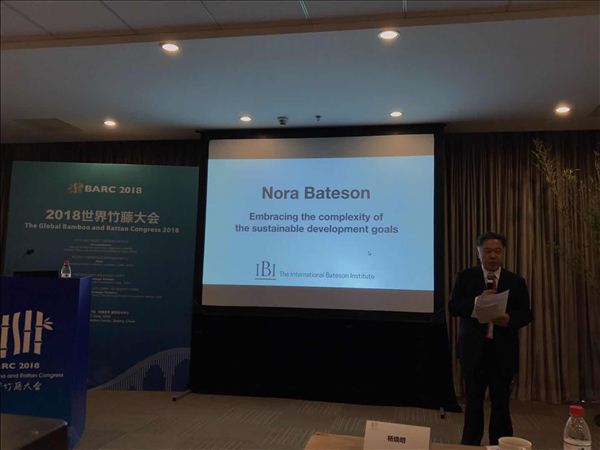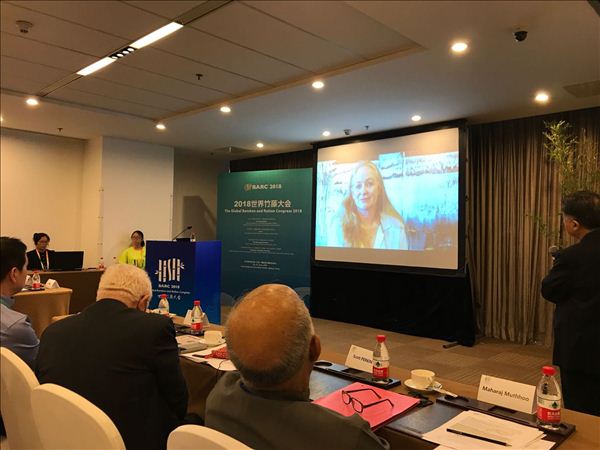中国生物多样性保护与绿色发展基金会、国际竹藤组织共同主办“绿色经济与可持续发展(Green Economy and Sustainable Development)”平行论坛成功召开!本次会议由中科院院士、华大基因理事长杨焕明全程主持。

罗马俱乐部(Club of Rome)成员、屡获殊荣的电影制片人、作家和教育家Nora Bateson女士也为本次论坛发来分享题为“拥抱可持续发展目标的复杂性”的视频。其中有关于 Bateson女士“温暖数据”的文章可以在https://hackernoon.com/warm-data-9f0fcd2a828c上查阅。

现绿会工作人员将Bateson女士的发言稿翻译成中文,以飨读者。
Hello, I’m Nora Bateson and I work in a combination of fields that bring together things like ecology and family therapy, economy, anthropology, education and the arts, politics – it’s a strange job that I have moving through the world in this way. What I do is, I work in all these different fields to help bring in a way of seeing and perceiving the interdependency of our world - of the way that we think and the way that we have to survive. Sometimes that is about our work in society or our relationship to our family, sometimes its also about the air that we breathe, the water that we drink. It is about the way that we make money to feed our family and be within our society, to have the status and the meaning that our presence has or doesn’t have.
大家好,我是诺拉·贝特森,我在一个复合领域工作,它结合了生态学和家庭治疗、经济、人类学、教育、艺术和政治等——这是个特别的工作,我借此走遍世界。我从事不同领域的工作,提出感知世界相互依存的方法——一种思考和生存方法。这一方法与我们的社会工作或与家庭关系有关,有时与我们呼吸的空气有关,有时与我们的饮用水有关。它关乎我们赚钱养家、立足社会,事关我们的社会地位和存在的意义。
All of those things have to come together: that’s education, food, medicine, economy, politics, it’s our culture and the way we think, the way we see the world. It comes down to the smallest details like language, like what you had for breakfast or the way you got to work today, or the way you might present yourself in an argument with a friend. All of those things have within them this intersection of our conceptual realm, the realm of our bodily existence in the environmental world, and also our societal and cultural beliefs and interactions with other people.
这些事物得汇聚在一起:教育、食品、医药、经济和政治,形成我们的文化、思维方式和看世界的方法。归结为最简单的细节,如语言、早饭吃了什么、乘什么交通工具上班、与朋友的争论方式等等。在我们的观念中、所处的环境世界里、社会文化信仰上、与他人交流时,所有事物是有交叉点的。
So when it comes to looking at the Sustainable Development Goals, what I would like to do is apply that same lens to these incredible goals, those ideals and projects that the UN proposed. And to recognize that even though they are compartmentalized as seventeen different goals, that behind them there is a very necessary interdependency between them.
因此,考虑可持续发展的目标时,我用同样的视角看待联合国倡导的目标、愿景和项目。尽管它们分属于17个目标,我们还是要意识到:表象之下,它们之间有必要的相互依赖关系。
It would be a mistake to think that you could, for example, take on the vast and important project of gender equality without looking at how the thinking involved there would affect things you might not expect - like soil, like education, like the ocean life, like the economy.
例如,若不考虑人们的观念是如何演变的,就承接男女平等的重大项目,会影响到一些你意想不到的事——如土壤、教育、海洋生物和经济。
So what I would like to do is to really bring us to a kind of conversation where we are asking questions and performing whatever research we need to perform around the SDGs, in such a way that their systemic and interdependent interaction is visible. Because if we make it invisible, we are going to see them as isolated projects. You might have one team working on life under the sea, and another team working on well-being for all, and another team working on gender equality or education.
因此,我想做的是我们大家进行一次真正意义上的交流,我们提问题,并围绕可持续发展目标进行研究,该方法使得系统和相互依赖的互动可见。假如它们不可见,我们会将其视为孤立的项目。你们可能有一个团队专注于海底生物,一个团队致力于全人类的福祉,另一个团队做性别平等或教育方面的工作。
Their efforts should be combined, they should be within in some kind of relevant communication with each other, because it is really a project that has many faces, but it is one project. Let me just do a little exercise with you of what happens when we zoom in to a particular SDG, and then kind of zoon out into a way of seeing that embraces some of the others. So, human beings are in a relationship not only with each other but with our environmental world - that is a precarious relationship right now, as we begin to see the degradation of our air and soil and water.
他们应共同努力,彼此做相关的交流。这确实是一个包含很多面的项目,但它是一个项目。接下来,我们做个练习,把镜头推近某一特定的可持续发展目标,再把镜头推远,看看它与其他项目是如何联系的。因此,不仅人和人是相互关系的,而且与我们的环境世界建立了关系——众所周知,我们的空气、土壤和水的质量都在恶化,现在这一关系并不稳定。
Our own existence is threatened. But, human beings, like every other organism that has existed, have a mandate. Our mandate is to feed our children. It’s really that simple, we have to feed our children– but what does it mean? It doesn’t just mean to make them breakfast in the morning, it means to live in a world in which we CAN make them breakfast in the morning. And the breakfast we feed them is nutritious to their bodies. And that their breakfast is grown in ways that wont deplete the soil or destroy the water system that they will then have to drink from. That the way the food is delivered to our shopping centers or markets isn’t creating a kind of pollution to the air that they breathe.
人类生存受到了威胁。但是,人类与其他存在过的有机体一样,都有使命。 我们的使命是养活我们的孩子。这真的很简单,我们要养活我们的孩子——但这是什么意思呢?这不仅意味着我们早上给他们做早餐,这意味着我们生活在一个可以给他们做早餐的世界。这种方式意味着,我们给他们的早餐是营养的,食物的生长过程不会令土壤退化,不会破坏我们的饮用水系统,在把食物运输到购物中心或市场的过程不会污染我们呼吸的空气。
That the processes of our own ecosystem are not violated by our own attempts to survive within it. So if we zoom all the way in… let’s say that we are going to feed the children fruit for breakfast. Some fruit and some grains, some protein and some rice maybe. If we look at where that fruit comes from, we are going to look at the environment in which the fruit trees and plants are growing. To do that, we need to also understand that the nutrients that feed those trees and plants are coming from the soil.
换句话说,我们的生存方式不应该危害生态系统。因此,如果我用最生活化的具体的例子来说的话...比方说我们也许早餐给孩子吃一些水果、谷物、蛋白质和米饭。如果我们要看水果是从哪儿来的,我们得看果树和庄稼生长的环境。我们还得明白果树和庄稼的养分源自土壤。
Those nutrients are created by the bacteria that live in the soil, the tiny microorganisms that live in the soil and feed on all sorts of organic matter in the soil. They make the vitamins and the hormones, and the various things needed for the plant to grow.
这些营养素是由生长在土壤中的细菌产生的,这些微小的有机物长在土壤中,以土壤中的各种有机物为食。它们可以制造维生素和激素,以及植物生长所需的各种物质。
And then that plant gets picked by someone - who is that someone that is picking that plant? What kind of equality are they living in? Are they cared for? Can they feed their children? And that becomes part of the next process of delivery, and eventually it gets to our table and goes into the next generation, into their bodily systems. But their bodily systems also include microorganisms, trillions of microorganisms. Our children’s ability to even digest and get the nutrients from that food are contingent upon those microorganisms. There’s more than that though, because we also have to ask - what is the emotional and intellectual state of our children and family? Because that also affects how much our children can take in of the breakfast we have fed them, and the way they will be perceiving their world as they go off to school - which brings us to education.
接下来,庄稼被收获——谁是收割庄稼的人?他们的生活中男女平等吗?他们受到照顾吗?他们可以养活自己的孩子吗?这成为下一交付过程的一部分。最后它们被端上餐桌供孩子食用,进入下一个环节,进入他们的身体系统。但他们的身体系统还包括数以万亿的微生物。我们孩子的消化能力和从食物中获取营养的能力依赖于这些微生物。不仅如此,因为我们还必须问 - 我们的孩子和家庭的情感和智力状态怎样?因为这也影响我们的孩子早餐摄取多少营养,他们离开家去上学时感知他们的世界的方式——这就把我们引导了教育这一话题。
So, you see there is a kind of interdependency here that needs to be taken into account. You can’t really separate the soil from equality, from economy, from the oceans, from the atmosphere or the water - these things are ultimately completely interdependent.
所以,我们做事情需要考虑相互依赖性。你无法彻底将土壤与平等、经济、海洋、大气或水分开——这些东西终究是相互依存的。
So, to my thinking, and in my work what I am interested in, is how we can become as familiar as possible with the nature of that interdependency. What are those relationships? How are those relationships in process within each other and with us? And I call that Warm Data. The definition of Warm Data is: transcontextual information about a complex system. Now, in this case we are looking at multiple complex systems coming together.
因此,在这个想法和工作中,我感兴趣的是如何能尽最大的可能熟知相互依存的本质。他们之间有怎样的关系?在相互作用的过程中,他们是怎样互相影响的,对我们有什么样的影响?我称之为“温暖数据”。“温暖数据”的定义是:关于复杂系统的跨文本信息。这种情况下,我们寻求的是汇聚在一起的多个复杂系统。
On the one hand it’s very simple, just imagine a kid eating a bowl of fruit. But in that simple act there is so much complexity, and if we want to be prepared to really respond and protect that process in its ultimate potential, we have to be able to recognize our own role in that - our own capacities for conceiving of how we see the world in another way, perceiving these almost invisible, but absolutely vital systems that we need to survive…and that our micro-bacteria need to survive, and that the micro-bacteria in the soil need to survive.
从另一个方面看,这很容易理解。想象一下一个小孩吃了一碗水果。但这一简简单单的行为包含着很多复杂性,如果我们想尽可能地做好准备应对并保护这一过程。我们需要认清自己在这一过程中扮演什么样的角色——我们孕育另一种方式认识世界的能力,感知这些无形却至关重要的系统…微菌需要生存,土壤中的微生物也需要生存。
And that requires that we treat each other and our natural world with respect.
这一切,需要我们善待人和自然。
编译/Tracy 审/Shuya 编/Angel


